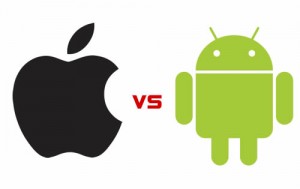 A recently uncovered Apple research study showed that prior to January of 2011, the largest factor for people buying an Android phone instead of an iPhone was that the iPhone was not available on their carrier. This was just prior to Apple releasing an iPhone for Verizon in February of 2011 and then later for Sprint in October of that year. Since last year, the iPhone is now available on the top three carriers in the United States. Not coincidentally, iPhone sales have continued to grow at record paces, and as I wrote previously, carriers who don’t have the iPhone are losing customers to those that do.
A recently uncovered Apple research study showed that prior to January of 2011, the largest factor for people buying an Android phone instead of an iPhone was that the iPhone was not available on their carrier. This was just prior to Apple releasing an iPhone for Verizon in February of 2011 and then later for Sprint in October of that year. Since last year, the iPhone is now available on the top three carriers in the United States. Not coincidentally, iPhone sales have continued to grow at record paces, and as I wrote previously, carriers who don’t have the iPhone are losing customers to those that do.
The release of the next iPhone model this fall will mark the second upgrade cycle opportunity that customers will have to switch to the iPhone on Verizon and Sprint. This past year I have seen a high number of my clients switch to the iPhone that have Verizon or Sprint. I know many people who say they are waiting for the next iPhone to switch away from their Android or BlackBerry phones this year. Assuming that this small sample size will extrapolate out further, Apple stands to benefit from some pent-up iPhone demand this upgrade cycle. By next year’s iPhone release, customers on Verizon and Sprint will have had at least two full years to complete the usual two-year contracts that most carriers require before upgrading their phones. I expect that we will see the full impact of Apple’s entry into the Verizon and Sprint markets by that time.
Regardless, even if one is inclined to look at the raw marketshare numbers of the various Android-based smartphones on the market, the reality is that pure volume does not drive the success of the smartphone market. Studies have shown that iPhone users are very different than Android users, primarily when it comes to spending money on apps or driving profits for mobile carriers. In addition, Apple makes a lot of money from their iPhone sales, where most of the various Android device makers are not generating great profits, nor does Google derive any real profit from their Android platform. For the sake of the long-term health of a platform, not making any profits doesn’t bode well for continued industry support.
The bottom line is that any perceived marketshare victories for the Android platform in the past were largely due to the simple fact that people who wanted the iPhone on their carrier couldn’t get it. After this upcoming upgrade cycle, we should see further evidence of the ever-growing dominance of the iPhone. There’s little reason to believe that the iPhone is losing its status as the premier smartphone platform, especially when bolstered by the dominance of the other iOS device, the iPad. If you are considering an iPhone or iPad purchase, proceed without hesitation. If you are planning an Android device purchase on the premise that the Android platform is reaching parity with Apple’s iOS devices, please consider very carefully before committing your money.